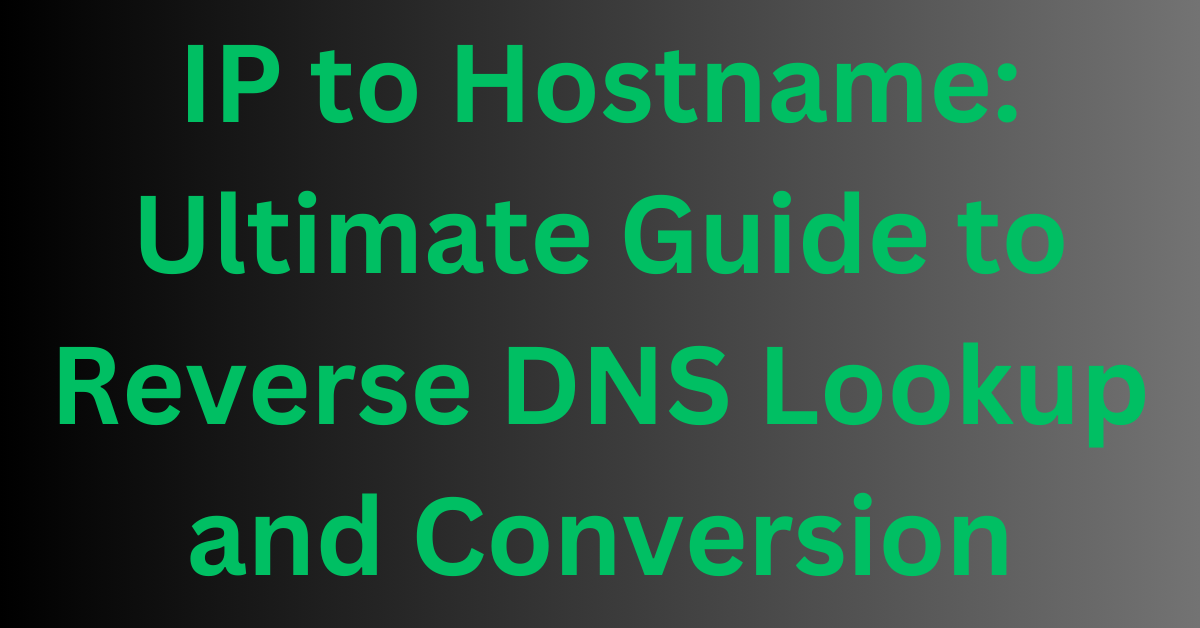
27
IP to Hostname: Ultimate Guide to Reverse DNS Lookup and Conversion
Converting an IP address to a hostname, often called reverse DNS lookup, is a process that maps numerical IP addresses back to human-readable domain names. This guide explores the concept, methods, tools, and practical applications, helping users troubleshoot networks, enhance security, and verify online identities efficiently.
IP to Hostname: Ultimate Guide to Reverse DNS Lookup and Conversion
In today's digital landscape, understanding how to map an IP address back to its corresponding hostname is essential for network administrators, cybersecurity experts, and everyday users. This process, commonly known as reverse DNS lookup, allows you to uncover the domain name associated with a given IP. Whether you're troubleshooting connectivity issues or verifying server authenticity, mastering IP to hostname conversion can save time and enhance your online security. In this comprehensive guide, we'll break down everything you need to know, including step-by-step methods, tools, and best practices.
What is IP to Hostname Conversion?
IP to hostname refers to the technique of translating a numerical Internet Protocol (IP) address into a readable hostname or domain name. Unlike forward DNS, which resolves domain names to IPs, this reverse process helps identify the owner or origin of an IP address.
For instance, if you have an IP like 192.0.2.1, a successful conversion might reveal it belongs to example.com. This is particularly useful in scenarios like email spam detection, where verifying the sender's hostname from their IP can prevent fraud. The process relies on Pointer (PTR) records in the DNS system, which store these reverse mappings.
Key benefits include improved network diagnostics and better threat intelligence. However, not all IPs have associated hostnames, especially private or dynamic ones, leading to occasional "no hostname found" results.
How Does Reverse IP Lookup Work?
Reverse IP lookup operates through the Domain Name System (DNS) infrastructure. Here's a simplified breakdown:
- Query Initiation: You input an IP address into a lookup tool or command-line utility.
- DNS Resolution: The system queries the DNS server for PTR records in the in-addr.arpa domain (for IPv4) or ip6.arpa (for IPv6).
- Record Retrieval: If a match exists, the DNS returns the hostname; otherwise, it might return an error.
- Response Delivery: The tool displays the hostname, often with additional details like location or ISP.
This mechanism ensures accurate mapping but can be affected by factors like DNS caching or misconfigured records. For advanced users, understanding IPv6 conversions adds complexity, as they use longer hexadecimal addresses.
Step-by-Step Guide to Find Hostname from IP Address
Finding a hostname from an IP is straightforward with the right approach. Follow these steps for common methods:
Using Command-Line Tools
- On Windows: Open Command Prompt and type nslookup [IP address]. Press Enter to see the hostname.
- On macOS/Linux: Use Terminal and enter dig -x [IP address] or host [IP address] for quick results.
Online Tools
- Visit a reliable IP hostname converter website.
- Enter the IP in the search field.
- Click "Lookup" and review the output, which may include the domain from IP address.
Always use trusted sources to avoid data privacy risks. For bulk queries, scripting with Python's socket module can automate the process: import socket; print(socket.getnameinfo((IP, 0))[0]).
Popular Tools for IP to Hostname Lookup
Several free and paid tools simplify the conversion process. Here's a comparison:
Tool NameTypeFeaturesProsConsBest ForDNS Checker | Online | Bulk lookups, IPv6 support | Fast, user-friendly | Limited free queries | Beginners
MX Toolbox | Online | Integrates with email checks | Comprehensive reports | Ads on free version | Email verification
Command-Line (nslookup) | Built-in | No installation needed | Quick for tech-savvy users | No GUI | Developers
WhatIsMyIP | Online | Location and ISP details | Mobile-friendly | Basic functionality | Casual users
Python Socket Library | Scripting | Customizable automation | Highly flexible | Requires coding knowledge | Advanced automation
These tools cater to different needs, from simple checks to enterprise-level monitoring. Choose based on your frequency of use and technical expertise.
Benefits of Using a Reverse DNS Tool
Employing a reverse DNS tool offers numerous advantages:
- Security Enhancement: Detect phishing by verifying if an IP matches its claimed hostname.
- Network Troubleshooting: Identify misconfigurations in servers or routers.
- SEO and Analytics: Webmasters can track visitor origins more accurately.
- Compliance: Businesses ensure regulatory adherence by logging accurate domain data.
By regularly performing these lookups, you can maintain a robust digital footprint and mitigate potential risks.
FAQs About IP to Hostname
What if no hostname is found for an IP?
This often occurs with dynamic IPs or those without PTR records. Try checking with multiple tools or contacting the ISP.
Is IP to hostname the same as hostname to IP?
No—hostname to IP is forward DNS resolution, while IP to hostname is the reverse process.
Can I convert IPv6 addresses to hostnames?
Yes, using similar tools like dig with the -x flag, though support varies by tool.
Are there privacy concerns with reverse IP lookups?
Lookups reveal public data, but excessive querying might flag your activity. Use VPNs for anonymity if needed.
How accurate are free IP hostname converters?
Most are reliable for public IPs, but accuracy depends on up-to-date DNS records.
Conclusion
Mastering IP to hostname conversion empowers you to navigate the complexities of networking with confidence. From basic command-line queries to advanced tools, this guide provides the foundation to perform reverse IP lookups effectively. Whether for personal use or professional applications, incorporating these techniques can enhance security, efficiency, and insight into online interactions. Start experimenting with a simple lookup today, and explore how this seemingly niche skill can transform your digital toolkit. Remember, staying informed about DNS updates ensures your conversions remain accurate in an ever-evolving internet landscape.
Contact
Missing something?
Feel free to request missing tools or give some feedback using our contact form.
Contact Us